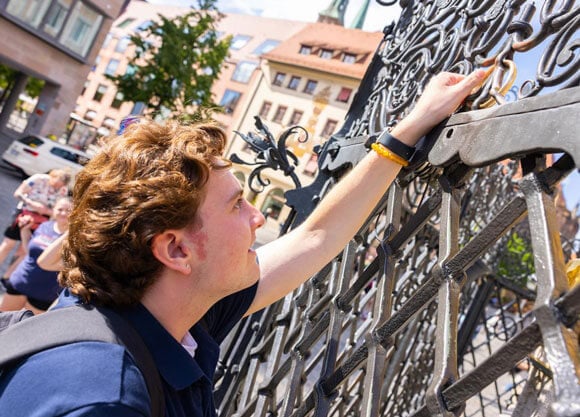
Course and accompanying European trip opens students' eyes to Holocaust
June 06, 2025

June 06, 2025

Since its inception in 2010, COM-340 has been a course offered to all students, teaching the impact of media, storytelling and branding worldwide.
This specific section of the course began with lectures, readings and discussions about the Holocaust. It then shifted to analyzing documentaries, feature films, shorts and even cartoons. And culminated with the class traveling to places they learned about throughout the course.
Ewa Callahan, associate professor of interactive media and design, guided students through Europe. The itinerary consisted of historic sites, focusing on locations dedicated to the Holocaust in Poland, the Czech Republic and Germany.
“The most meaningful and fascinating part of this course is witnessing how students move from learning through knowledge to learning through emotion,” said Callahan. “The students begin by absorbing information during the course through text and film, but when they visit the actual sites where atrocities took place, something shifts. They start making connections on a much deeper level. So many discussions start with ‘I did not realize.’”
The conversations that derive from the student experience abroad makes the effect of these trips extremely impactful, on a personal and academic level.
“They share their discoveries, and their stories become vivid. They often share what made the most significant impact on them. It’s clear how much more they understand, beyond what any textbook could offer,” Callahan explained.
Brianna Trachtenberg ‘25, MS ‘26, said that her Jewish upbringing made her especially eager to take part in the course.
Open dialogue played a significant role both in the classroom and during the trip, an approach that Trachtenberg plans to carry into her other classes and future life experiences.
“While some of the topics were tough to talk about, it was important that we were able to share what we were thinking and what we took away from the experience so we can get multiple perspectives,” said Trachtenberg. “This approach helped me get the most out of my experience, and is something I will continue to apply to my other classes. No matter what, we should always be asking questions and be ready to learn more from others."
Melanie Henshaw, MS ‘25, took the course as an independent study beyond the requirements of her masters degree, due to her interest in visual storytelling, and urge to learn from Callahan’s extensive knowledge and research on Holocaust art.
“It was the trip of a lifetime,” said Henshaw.
The experience was deeply emotional and eye-opening for Henshaw; it shaped her worldview as she confronted the deeply impactful historical sites and firsthand accounts of individuals who lived it.
“It was emotional and inspired me to create art of my own to process the feelings being there caused,” said Henshaw. “Children's artwork and secret artworks by camp prisoners really brought home the reality of the impossible struggle of trying to live each day despite an overwhelming threat to life and safety. It was heartbreaking.”
Noah Sussal ‘27 explainex the impact of traveling with other Quinnipiac students.
“Traveling with other students shaped my experience by giving me a sense of comfortability and familiarity, and providing me with an opportunity to make new friends and lasting relationships,” said Sussal.
Callahan said she hopes students who take the course and study abroad gain a deeper understanding of the world and its complexities.
“Too often, the Holocaust is seen as something that happened long ago,” said Callahan. “But I want students to leave with a greater sensitivity toward others, and a clearer understanding of the causes and consequences of historical events — how social, political and economic forces shape them. And I want them to remember the Holocaust, especially now, as fewer and fewer young people have opportunity to learn about it.”
Quinnipiac Today is your source for what's happening throughout #BobcatNation. Sign up for our weekly email newsletter to be among the first to know about news, events and members of our Bobcat family who are making a positive difference in our world.
Sign Up Now